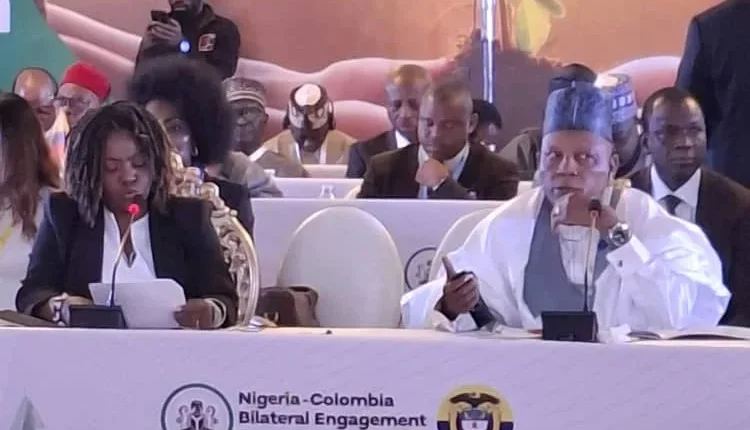Nigeria, Colombia sign MoU to strengthen political, economic ties
Nigeria, Colombia sign MoU to strengthen political, economic ties
The Federal Government and the Republic of Colombia have signed a Memorandum of Understanding (MOU) on political consultations with a view to opening a new and significant chapter in relations between both countries.
The Voice Media Trust (VMT NEWS) report that the MOU was signed on Monday during the Nigeria-Colombia Bilateral Meeting and Business Forum, held at the Presidential Villa, Abuja.
It was appended by Nigeria’s Minister of Foreign Affairs, Amb. Yusuf Tuggar, and the Deputy Minister, Multilateral Affairs, Ministry of Foreign Affairs, Colombia, Mauricio Jaramillo Jassir.
Jassir explained that on the bilateral front, the MoU relates to “very frequent political dialogue” with Nigeria and visa approvals for its diplomats, thereby making it easier for its diplomats to visit Nigeria.
Speaking at the plenary session of the Nigeria-Colombia Business Forum, Vice-President Kashim Shettima, implored both countries to take advantage of their abundant potential and turn them into palpable and substantial economic gains.
This, he said, should be driven by the private sectors of the two nations, exploring new opportunities, deepen partnerships, and address common challenges.
“We cannot achieve that unless we compare our differences and similarities, as well as our resources and potential.
” This is a practical way to propel trade and investment, improve agriculture, foster culture, and exchange ideas that will mutually benefit our countries.
“The private sectors of our two nations are therefore urged to take advantage of the abundant potential of our countries and transform them into tangible economic gains,” he said.
Shettima said Nigeria had since diversified and expanded its exports beyond crude oil, with agriculture, minerals, and manufactured products as some of the new areas of concentration.
He said, “The tariffs that confront our exports in other parts of the world are a reminder of the danger of dependence on a narrow base.
“For Nigeria, this is a call to diversify our exports beyond crude oil, expanding into agriculture, minerals, and manufactured products.
” I believe that Colombia too is bound by the determination to expand its economy beyond the bounds of tariff barriers.”
In response to the global constraints, Shettima explained that Nigeria was working towards elevating its agriculture from subsistence to mega-business, as well as transforming smallholders into global conglomerates.
He said, “As a country, we are investing in innovative technologies for livestock breeding, developing machinery, producing chemical-based products such as fertilizers, herbicides, and pesticides, and creating a strong supply chain.
” This is also an area where partnerships with Colombia will be vital.
“We must prioritise sectors that are natural pillars of our economies. In agriculture, we share comparative strengths in cocoa, coffee, and tropical fruits.
” In energy, Nigeria remains a leader in oil and gas, while Colombia has potential in coal and renewable energy.
“In manufacturing, from textiles to machinery, both nations can collaborate to build capacity, exchange knowledge, and attract the kind of investments that secure jobs and prosperity for our peoples.”
To take advantage of the opportunities that abound in their domains, Shettima identified three things both Nigeria and Colombia must do, including monitoring “global trade policies to adapt swiftly.”
He said both nations must diversify exports to reduce dependence on single products, and “create a business environment attractive enough for foreign investors.
The vice-president added that by pursuing these, both nations “can turn shifting tides into shared prosperity.”
Read Also: police recover stolen vehicle, apprehend suspects in Taraba
On cultural ties between both nations, Shettima said, “Our practical roadmap to the future is to acknowledge that culture is a bridge for innovation, economic development, and mutual prosperity.
” Nigeria’s creative sector remains an engine for unleashing the potential of our teeming youths population.
” Reinforcing our connections in culture, education, science, and technology is fundamental for building a resilient and globally competitive creative economy.
“It is therefore time to collaborate in capacity building, skill development, cultural exchange, digital innovation, and intellectual property protection.
” We must extend our acquaintance to each other’s literature, languages, music, films, arts, and festivals.”
The vice-president of the Republic of Colombia, Mrs Francia Márquez, said her team was in Nigeria to reaffirm bilateral relations, noting that the country remains a strategic market for Colombia.
She stated that Colombia was currently exporting to Nigeria, particularly in the field of leather, adding that she seeks to explore new paths with Nigeria in renewable energy.
She added, “Similarly, we can make progress in higher education by connecting Colombian and Nigerian youths.”
According to her, the business meeting in Nigeria will allow Nigeria to explore cooperation opportunities and work together in the fields of technology and services for both countries’ people.
She thanked the Nigerian government for the hospitality, assuring, “We will work together for social development, social justice, peace, and security for our people.”
Earlier, Tuggar maintained that Colombia’s history was tied to Nigeria, particularly during the slave trade when Nigerians found their way to Colombia.
He said the development was an opportunity to strengthen historical and economic ties between both countries and bolster trade.
Tuggar added, “There is room for improvement in areas such as agriculture, hydrocarbons, and pharmaceuticals.”
The Deputy Minister of Multilateral Affairs, Ministry of Foreign Affairs, Colombia, Mauricio Jassir, said it was very important for Colombia to diversify her relationship with the world, especially with Nigeria.
He stressed the importance of exploring its relations with Nigeria, maintaining that Nigeria remains the best gateway to reinforce bilateral cooperation with Africa.
He expressed optimism that the Nigerian side would explore Colombia’s strategic position in South America.
On the bilateral front, he said, two MOUs were of interest to Colombia: to have “very frequent political dialogue” with Nigeria and visa approvals for its diplomats so it will be easier for its diplomats to visit Nigeria.”

